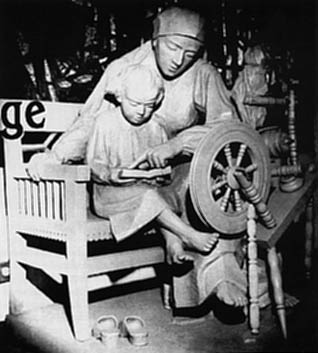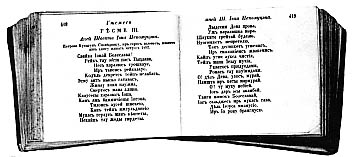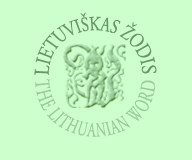-
 On
May 7, 1904, Tsar Nicholas II of Russia issued an order restoring to
the Lithuanians the right to use the Latin alphabet in printing
Lithuanian books and newspapers. So 2004 marks the 100th Anniversary
of the re-establishment of the free press in Lithuania. During the
forty years of prohibited Lithuanian printing, known as the Press
Ban, Lithuanians suffered greatly. Many of Lithuania's sons and
daughters rotted in cruel Russian prisons, while others were
banished to the wilds of Siberia to die in exile. It is impossible
to estimate the moral and physical loss caused by this prohibition
of printing which threw the Lithuanian Nation into mental stagnation
for nearly half a century; and all this for the love of Lithuanian
language, Lithuanian books and newspapers. On
May 7, 1904, Tsar Nicholas II of Russia issued an order restoring to
the Lithuanians the right to use the Latin alphabet in printing
Lithuanian books and newspapers. So 2004 marks the 100th Anniversary
of the re-establishment of the free press in Lithuania. During the
forty years of prohibited Lithuanian printing, known as the Press
Ban, Lithuanians suffered greatly. Many of Lithuania's sons and
daughters rotted in cruel Russian prisons, while others were
banished to the wilds of Siberia to die in exile. It is impossible
to estimate the moral and physical loss caused by this prohibition
of printing which threw the Lithuanian Nation into mental stagnation
for nearly half a century; and all this for the love of Lithuanian
language, Lithuanian books and newspapers.
- Here is some historical background,
which appeared in the October, 1928, Vol. 9, No. 2 issue of The
Journal of Race Development, under the section
"Lithuanians":
- "The Russian Governor-General
Muravyov, 'The Hanger,' in 1863, forbade the use of Lithuanian
(Latin) characters in all printed matter, from prayer books to
newspapers; and, in the following year, made such printing a crime.
He also decreed that all books should be printed with Russian
(Cyrillic) characters in order to accustom the people to adopt the
Russian language and forget their own. This infamous ban lasted
forty years. The Lithuanian literature was not allowed to live in
Lithuania, so it sought a new home in Tilze (East Prussia,
Lithuanian Minor), from whence books printed in Lithuanian
characters were smuggled into Russian-occupied Lithuania.
- In 1904 a great revolution broke out
in Russia. Fearing that the Lithuanians might join the revolution,
the Tsar, in order to gain their good will, restored to them the
freedom of the press. Previous to this not only
 was
the liberty of the press denied to them, but all national movements,
which tended to keep alive the national spirit and language, were
forbidden and punished by banishment to Siberia. This severity had
the most telling effect upon the Lithuanian people. Their sturdy
sons left their birthplace for all corners of the globe; about a
million Lithuanian coming to the United States of America. was
the liberty of the press denied to them, but all national movements,
which tended to keep alive the national spirit and language, were
forbidden and punished by banishment to Siberia. This severity had
the most telling effect upon the Lithuanian people. Their sturdy
sons left their birthplace for all corners of the globe; about a
million Lithuanian coming to the United States of America.
- During oppression's darkest moments,
each Lithuanian mother taught her children in secret the beloved
tongue; taught them to read in smuggled and hidden books the great
stories of their past; whispering to them: 'Soon perhaps, our
freedom may come again. You, my son, may help to free us.' During
the short period of fourteen years between 1904 and 1918 when
Lithuania regained its independence, there was a remarkable growth
of Lithuanian literature of permanent value. Writers and poets, such
as Jonas Maciulis-Maironis, Vincas Kreve-Mickevicius, Jonas
Biliunas, Ignas Seinius, Antanas Zukauskas-Vienuolis, Julija
Zymanriene-Zemaite, Marija Peckauskaite-Satrijos Ragana, and others
created wonderful gems of Lithuanian literature.
- Besides there were organized many
societies of education, as well as a scientific society to conduct
searches of ancient tombs and burial places for the purpose allowed
to be printed discovering the nature of Ancient Lithuanian culture.
Mention must be made of the Society of Fine Arts and the Temperance
Society, the former for developing the Lithuanian national style and
the latter for saving the poor people from squandering their
possessions to obtain vodka. The Lithuanian Nation, once the
commercial door to Russia and the political barrier between Prussia
and Russia, has arisen in the midst of the world war wreckage,
raised an army for self defense, set up a republic, elected a
president and a parliament, established a financial and judicial
foundation. A splendid achievement."
-
-
|

